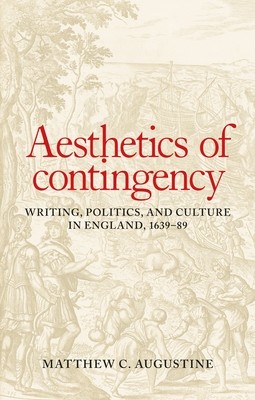
- We will send in 10–14 business days.
- Author: Matthew C Augustine
- Publisher: Manchester University Press
- ISBN-10: 1526100762
- ISBN-13: 9781526100764
- Format: 14 x 21.6 x 1.8 cm, hardcover
- Language: English
- SAVE -10% with code: EXTRA
Reviews
Description
Aesthetics of contingency provides an important reconsideration of seventeenth-century literature in light of new understandings of the English past. Emphasising the contingency of the political in revolutionary England and its extended aftermath, Matthew Augustine challenges prevailing literary histories plotted according to structural conflicts and teleological narrative. In their place, he offers an innovative account of imaginative and polemical writing, in an effort to view later seventeenth-century literature on its own terms: without certainty about the future or, indeed, the recent past. One consequence of hewing to this premise is that the familiar outline of the period - with red lines drawn at 1642, 1660, or 1688 - becomes suggestively blurred. For all of Milton's prophetic gestures, for all of Dryden's presumption to speak for, to epitomise his Age, writing from the later decades of the seventeenth century remained supremely responsive to uncertainty, to the tremors of civil conflict, and to the enduring crises and contradictions of Stuart governance.
A study of major writings from the Personal Rule to the Glorious Revolution and beyond, this book also re-examines the material conditions of literature in this age. By carefully deciphering the multi-layered forces at work in acts of writing and reception, and with due consideration for the forms in which texts were cast, Augustine explores the complex nature of making meaning in and making meaning out of later Stuart England.
Of interest to students of seventeenth-century literature, politics, and religion, Aesthetics of contingency promises to transform how we imagine the shape of early modern literary history.
EXTRA 10 % discount with code: EXTRA
The promotion ends in 7d.04:43:18
The discount code is valid when purchasing from 10 €. Discounts do not stack.
- Author: Matthew C Augustine
- Publisher: Manchester University Press
- ISBN-10: 1526100762
- ISBN-13: 9781526100764
- Format: 14 x 21.6 x 1.8 cm, hardcover
- Language: English English
Aesthetics of contingency provides an important reconsideration of seventeenth-century literature in light of new understandings of the English past. Emphasising the contingency of the political in revolutionary England and its extended aftermath, Matthew Augustine challenges prevailing literary histories plotted according to structural conflicts and teleological narrative. In their place, he offers an innovative account of imaginative and polemical writing, in an effort to view later seventeenth-century literature on its own terms: without certainty about the future or, indeed, the recent past. One consequence of hewing to this premise is that the familiar outline of the period - with red lines drawn at 1642, 1660, or 1688 - becomes suggestively blurred. For all of Milton's prophetic gestures, for all of Dryden's presumption to speak for, to epitomise his Age, writing from the later decades of the seventeenth century remained supremely responsive to uncertainty, to the tremors of civil conflict, and to the enduring crises and contradictions of Stuart governance.
A study of major writings from the Personal Rule to the Glorious Revolution and beyond, this book also re-examines the material conditions of literature in this age. By carefully deciphering the multi-layered forces at work in acts of writing and reception, and with due consideration for the forms in which texts were cast, Augustine explores the complex nature of making meaning in and making meaning out of later Stuart England.
Of interest to students of seventeenth-century literature, politics, and religion, Aesthetics of contingency promises to transform how we imagine the shape of early modern literary history.


Reviews